[ad_1]
- Is your website losing traffic?
- Is your organic traffic going down?
- Are you losing keyword ranking?
- Despite trying hard, you are not able to reach on page #1 (Even with new content)
If you answer yes to one or more of this, You might be a victim of Keyword cannibalization.
What is “Cannibalization in SEO” and how it works?
How to find if your website is impacted by Keyword cannibalization
and
How to fix keyword cannibalism issue.
This is what you are going to learn today.
Keyword cannibalization (also known as content cannibalization) is one underlooked segment of keyword research and keyword mapping, if not done right, that could severely impact your website traffic.
In fact, last year, ShoutMeLoud traffic dropped significantly, and when I diagnose the cause for the same, my research concluded that I was losing traffic because multiple pages were trying to rank for the same keyword. (Cannibalization issue)
In turn, Google has started downranking many such clusters of pages, and over a course of a few months, I lost more than 20% of the traffic.
It was a panic situation, however hue and cry never helps, so I did what any optimist blogger would do.
I started fixing the problem!
It took months of work to finally put my website out of cannibalization and this tutorial is a reflection of all the work I have put to recover from keyword cannibalized websites.
This is an extra-ordinary issue that could happen to anyone who has a website, and never focused on Keyword mapping or building logical internal links or could be happen due to uncontrollable circumstances
Let’s dive deep into this subject, and learn something new today.
What is Keyword cannibalization?
Keyword cannibalization is an SEO issue that occurs when more than one page of your website is trying to rank for the same/similar keywords. This confuses the search engine, and it periodically tries to understand which one of the pages should be ranked on the first page.
In a lack of clear direction, it lowers down the ranking of all pages, and none of them rank for the target keyword.
Another common cause of Keyword cannibalization is when a webmaster creates multiple pages targeting the same topic. This may work initially, but as search evolves, those different pages end up serving the same searcher intent.
Most of the time this happens unintentionally, but the traffic and ranking impact of this is severe.
In my finding, I have seen an entire cluster of pages (category) losing the ranking because of keyword cannibalism.
What I found most interesting is, when keyword cannibalization is fixed, it resulted in improved ranking of entire category of pages.
I have tested this theory on a few websites, and every time the competing pages were identified, and proper action is taken, there is a significant improvement in the overall keyword ranking and hence traffic.
Cannibalization is one uncommon SEO issue where a lot of webmasters are not even aware of it. If your website is impacted by it, identifying and fixing this issue would do wonders for your website traffic.
Before that, let’s understand the common causes of cannibalization.
What Causes cannibalization?
1. Creating multiple pages targeting the same keyword:
A lot of bloggers and content marketers, end up creating a lot of pages targeting the same or similar keywords and hoping one of them would rank. This is now an age-old practice and something you should avoid. You can rather create a long-form article to target a bunch of keywords.
Read: Long Form Content SEO Ranking Strategy: 11 Must-Follow Tips to Rank
2. Improper internal linking:
This is another most common root cause of content cannibalization. At times, bloggers use the same “Keyword” on different articles to link to different pages. This is one sure shot way to confuse search engine bots and hence results in content cannibalization.
Often this is caused due to backlinks with wrong anchor text.
3. Changing search intent:
This is another important aspect you need to keep in mind when trying to identify and fix KW cannibalization. The search engine algorithm is ever-evolving, and what works today may not work tomorrow.
It is a good idea to keep an eye on search intent of your focused keywords, and be ready to optimize it with changing time and needs. If you don’t know how to do this, drop a comment below with your request, and I will create a post or video on this soon.
How to diagnose Keyword cannabalization:
The first thing you should check is if, your website is impacted by cannabalization. That means, finding is more than one internal pages are trying to compete for the same keyword.
There are many ways by which you can diagnose this, and lets look at some of the tools and techniques that helps you identify cannabalized pages on any website.
1. Sanitycheck (Using Google search console)
SanityCheck is one less known SEO tool that makes sense out of Google search console data. Sanity Check offers a module called “Cannibalization” that let you check which all pages are being cannibalized.
Here is how to use this tool:
- Create an account on Sanity Check
- Add your website
- Connect with Google search console
- Click on Reports > Cannabalization report
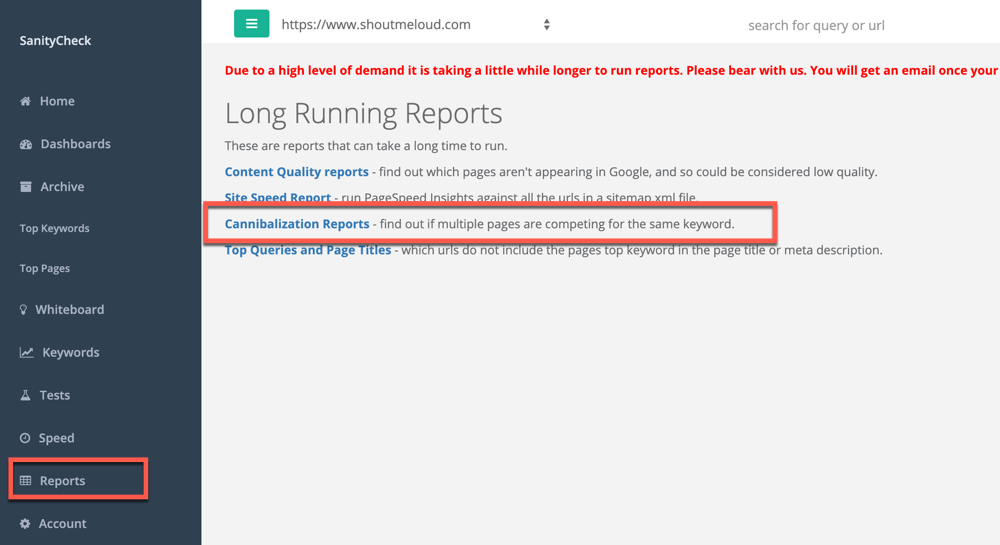
Once your report is ready, you will get an email for the same.
And this is how the report will look like:
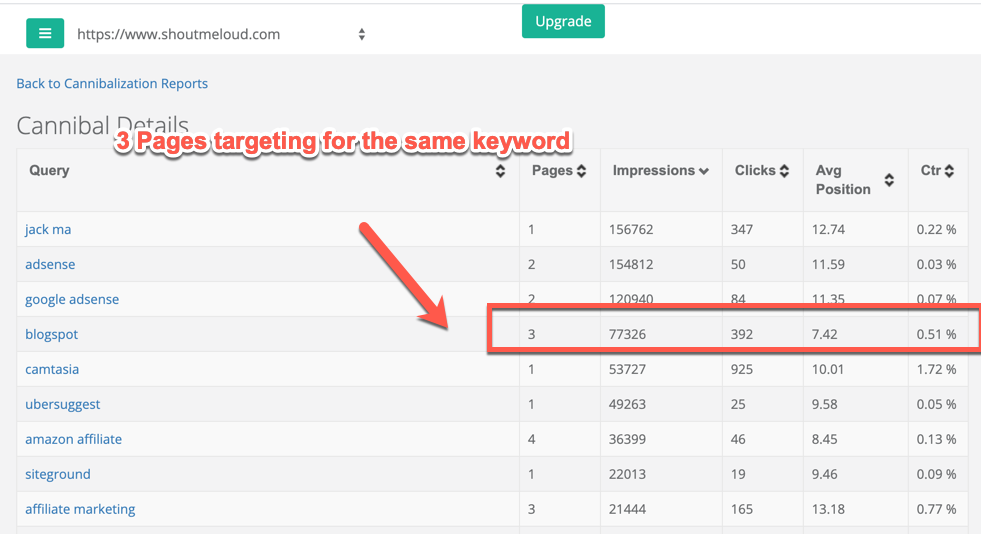
Now, you can click on “Query” to see which all pages are competing for the target query.
Note: Sanitycheck is not the best content cannibalization finder tool, but it definitely helps. They offer 14 days free trial, which is good enough for small-medium size websites to find the cannibalized content. I hope the team improves on this feature, which is definitely worth a lot of money.
2. Jetoctopus:
Jetoctopus is a cloud-based web crawler tool, that also provides a “Cannibalization report“. This tool is another easy to use tool, and here is how you can use it:
- Create an account on Jetoctopus
- Add your website
- Connect with Google search console
- Under GSC keywords > Cannibalization you can request for cannabalization report
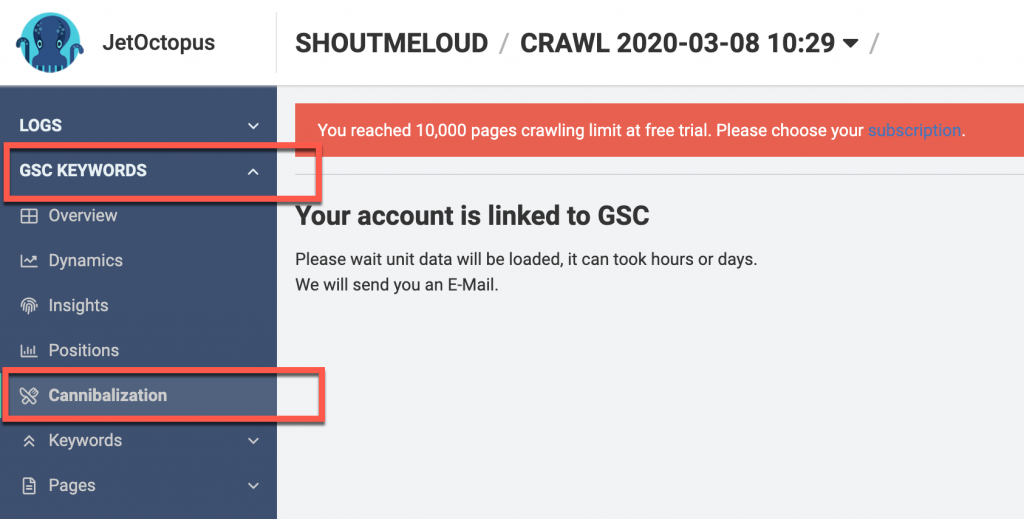
3. Ahrefs:
Ahrefs is another popular SEO tool that lets you see if more than one pages is trying to rank for the same keyword. You can use the Google sheet provided by them to create a quick report of all pages impacted with Keyword cannibalization.
This video tutorial explains how to use the Ahrefs + Google sheets to create a report on cannablized pages:
By the end of this exercise, you will have a report like this:
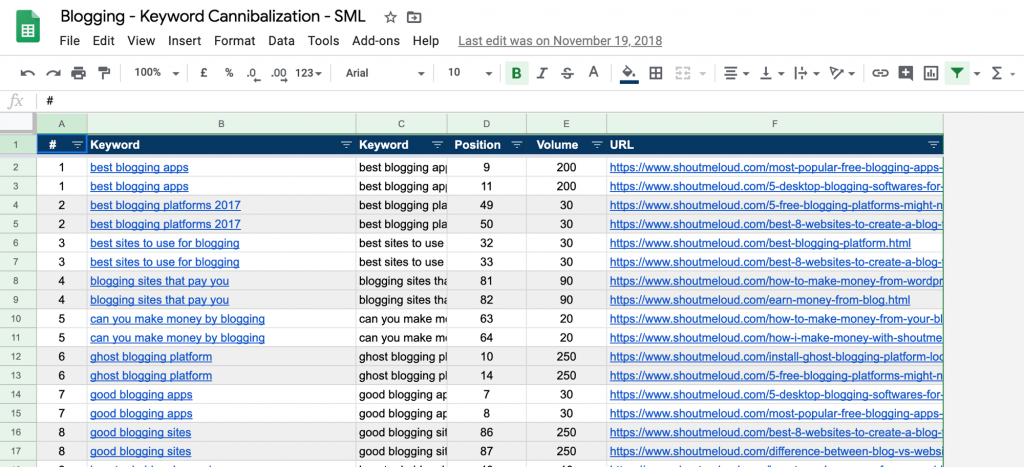
Ahrefs is perfect for webmasters, and SEO agencies who are trying to find if a website is penalized due to cannibalization.
4. Google Search console
I saved the best for the last, and this one works for all types of websites. You could use Google search console to diagnose the cannibalization issue.
- Login to Google search console
- Select your domain and click on Performance > Search results
- Search for keyword that you suspect is affected by cannablization
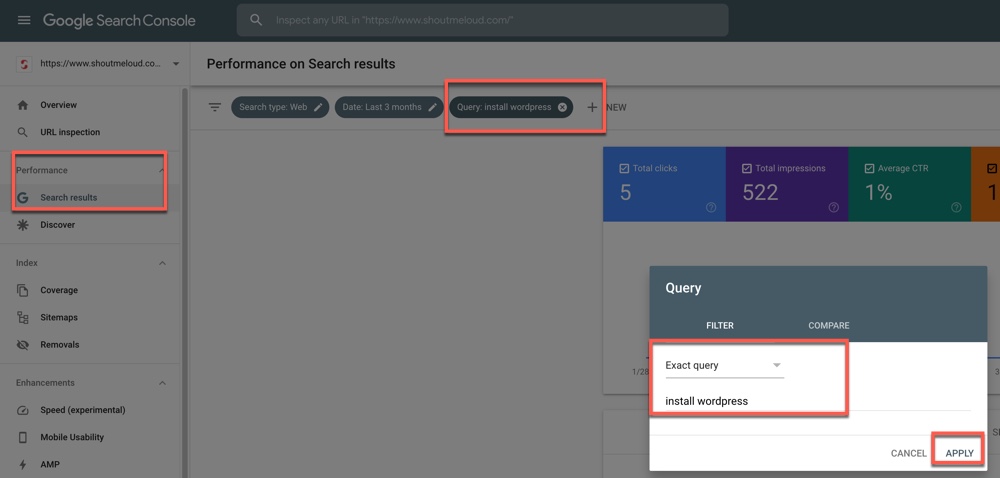
Click on pages, and you will have a list of pages that are trying to rank for the common keyword.
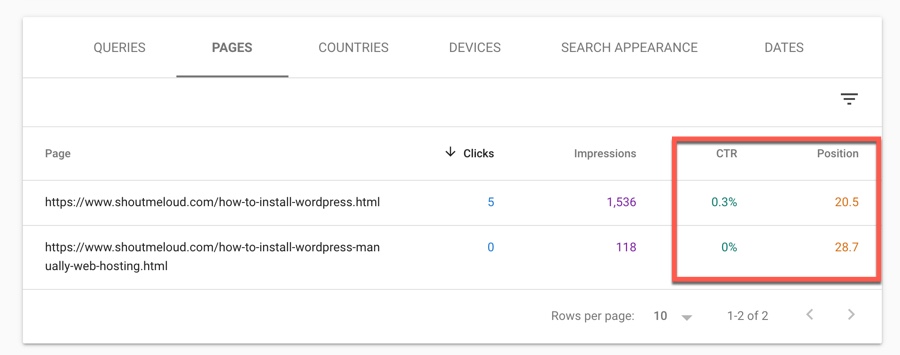
Now, based on research, you can decide how do you want to proceed with fixing this issue.
There might be more tools to identify Keyword cannibalization, so far I have found these tools to be the best.
How to fix the cannibalized content issues for SEO?
Once you have a list of pages that are competing for same keywords, the real work starts here.
Tip:
- Start with fixing the most obvious cannibalized content. Usually, you would see an immediate impact in overall search engine ranking, and search traffic.
- Be ready for wild traffic and ranking move for the next few days (While you fix your website), but if you are doing it right, you will be seeing the great results in months to come.
There are a few actions you could take at this stage to recover from cannabalization SEO penalty.
1. Fix On page SEO:
Often fixing on page SEO stuff such as:
- Meta title
- Meta description
- Remove Keyword
- Changing search intent
Helps in giving clear message to search engine about your target keywords. Internal link plays a major role, and something I have discussed in depth in the next section.
This is also a good time to start using any on-page SEO tools like SEMRush writing assistant, Frase or similar tools to optimize your pages based on real-world SEO data.
Read: How to write SEO friendly content
2. Update internal links:
A lot of time keyword cannibalization happens due to poor internal linking structure. It is common to see, a webmaster linking two different pages with the same anchor text, and this is by far one of the common reasons for cannibalization on older websites. What you could do here is, go through all the internal links of 2 cannibalized pages, and fix the internal anchor texts.
I have used extensively used this plugin called “WP Link Status” to find anchor text to any pages on my website.
This plugin also helps in quickly updating the anchor text or manipulating the links. Either way, WP Link status pro plugin is going to be really helpful to find and fix anchor text issues.
Also see: 4 Best WordPress internal linking plugin to improve URL Rating for SEO
3. Delete Content:
This is perhaps the fastest way to fix the cannibalized content problem. Once you have identified pages that are trying to rank for the same keyword, you can delete one of the pages which do not serve the purpose.
After deleting the page, you have two options:
Option 1:
- Set 404 or 410 code for the delete page and use Google URL removal tool to remove the page from web-index
- After 48 hours or so (once page is removed from web-index), change the status code from 404 or 410 code, and 301 redirect it to the page you picked as a winner.
I usually do the option 1, as I’m dealing with limited content. (About 2000 articles).
Option 2:
Note: You can also noindex the content and publish as a guest post on other websites, earning a solid backlink.
4. Merge two content:
Over the time, the search evolves and it would make more sense to merge two articles into one, and a quick google search could reveal the same.
An example from my experience is here:
I had two different pages talking about:
- Article 1: What is managed WordPress hosting
- Article 2: Best managed WordPress hosting
Both of them are two seperate article, and for long they both were ranking on the 1st page for different search intent.
However, I started noticing traffic drop on both of them, and a quick Google search also revealed, competitors are creating a single page answering both the topics in one. Moreover, Google has started giving weightage to a single article (covering both the intent) over two separate articles.
This is simply how the search was evolving for this keyword/topic, and the best course of action was to merge both of them into one, and thus also satisfy searchers intent.
When you are in similar situation, here are the steps you could
- Check the page SEO score (Page authority) of both the pages.
- Check and compare the organic traffic to both the pages. I use Monster insights that make things faster.
- Pick the page you want to keep, and move the content of other page to this one (This may require a bit of rewriting)
- Delete the other page, and redirect it to page you want to keep. It would be better if you redirect using the jump link technique, this way you will improve your chance of ranking.
- Fix all internal links
- Monitor the results
Bonus tip: At this stage, it is a great idea to use a Keyword rank tracker tool. I used AccuRanker, and added these keywords for tracking with a special tag called “Cannibalization”. This helped me to see the impact of such major SEO changes.
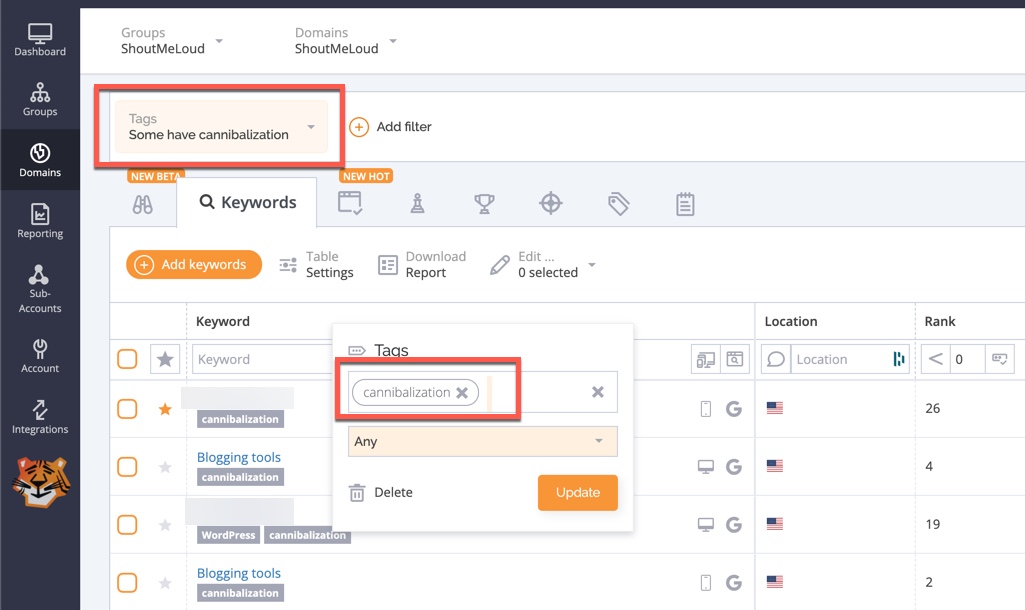
5. Canonical redirection:
This is another smart way to fix cannibalization issue. This is useful when two or more pages are cannibalized, but you don’t want to delete or merge it. In that case, you can pick one page that you want to rank, and from other pages set the canonical tag to the target page.
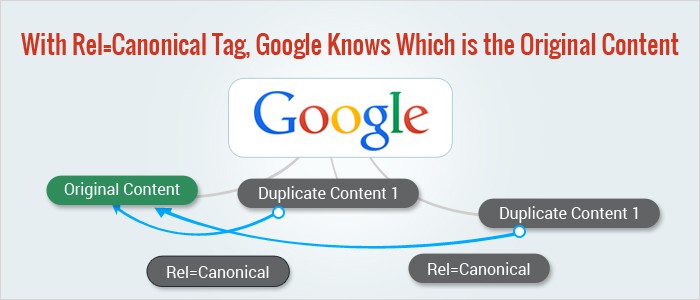
All the popular WordPress SEO plugins like Yoast SEO, offers canonical tag feature. If you are new to canonical SEO, read my earlier guide on:
What is URL Canonicalization and how to Use Canonical Tag Properly?
I have tested this, and this works too. However, I still prefer merge or delete than canonical in most of the cases.
How not to be impacted by Content Cannibalization in future
Well while you are fixing existing cannibalization issue, you also need to keep in mind about future content.
- Make sure your topic and keyword selection are well structured.
- Keyword mapping and clustering are going to be your superweapon to avoid duplicate content and cannibalized content.
- Content audit on a regular basis ensures you let go of low quality and slate content.
- Use breadcrumbs and follow the hub-spoke model for your website structure.
Once you have seen the negative impact of cannibalized content, you need to become more data driven when it comes to topic selection.
Well, I hope this guide that has helped you to identify and fix cannibalization issue on your website. If you have additional question, feel free to ask in the comment section below.
Also check out:

[ad_2]

